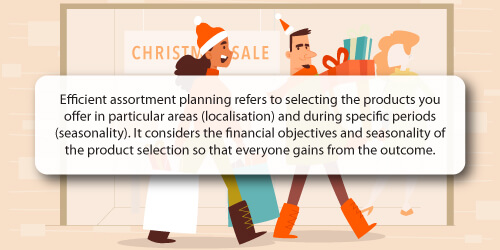According to an October 2022 survey commissioned by Deloitte, only one-third of the 50 retail executives polled were confident about maintaining or improving their profit margins. They were also concerned about the outlook for 2023, expecting consumer spending to slow. That could mean trouble for the global retail industry. But it also presents a problem you can solve through efficient assortment management.

The low barriers to entry mean retail has become a highly-competitive industry where standing out is difficult. Fortunately, you can achieve it if you’re determined and lean on the right partners for advice on what’s best for your business. Here's a piece of advice. In 2023, your assortment decisions are more critical than before and can determine whether or not you remain relevant.

1. Efficient assortment management leads to improved sales performance
Let us pose a question.
Why did you get into retail? What were your reasons? If you're in retail operations, was it because you wanted to be part of a retail brand that could provide shoppers with the products they needed at the best possible price? Was it to make money?
By the way, we're not judging you because there is no wrong answer. The point of retail is twofold: to please your customers and maximize your sales.
Of course, you can unpack each of these further. But that's a topic for another day. We want to focus on the second half of the equation to retail success: improving your overall sales.
And with that, we want to bring in the importance of your product assortment. Or should we say the efficient management of your product range?
But why should it be one of your priorities in 2023? By stocking the right products (selection) at the right place (localization) and at the right time (seasonality), you open up the opportunity to make a sale when shoppers are ready to buy.
We refer to it as catering to local demand.
Offering products that meet your customer's needs allows you to improve your sales. It’s one of the best examples of a mutually beneficial relationship.

2. Optimising your assortment allows you to combat rising inventory costs
If product assortment optimization leads to increased sales, you can argue that it can combat rising inventory costs too.
By focusing your efforts on stocking products that either sell high units (traffic building), high margin (profit-generating) or are must-have products (those with low levels of transferable demand), you optimize your shelf space.
That means you don't waste resources buying the wrong items, which end up not selling and taking up space that you could give to products that make you money.
It's a well-known fact that your inventory is one of your highest retail operating costs so it would make sense to find ways to reduce it. They’re the costs associated with ordering and holding stock.

Javad Nasiry, associate professor of McGill University's Desautels Faculty of Management says it best.
Shopify quotes him: "The more you know about your demand, the less uncertain you are about demand. That means you can manage your inventory better and reduce inventory levels in your warehouses because keeping inventory is costly."
It’s also where you can target average facings for your products at a specific level of your hierarchy. By decreasing shelf space for those products that aren’t selling as well as you’d hope, you can increase facings for your best-sellers.
It comes back to our first point on increasing your sales which entrenches the close relationship between sales and costs.

3. Tailoring your assortment leads to better buying decisions
Assortment optimization in retail may focus on pleasing your customers and maximizing your sales. But what is the underlying factor behind these goals?
In a phrase: improved buying consistency.
By that, we mean data-driven assortment planning, which helps you to improve the consistency and rationale behind your buying decision. Should you bring a certain product into your business? Maybe. But first, look at the data. If your data is saying yes, but only suggests a small range, it’s best to adhere to that.
Imagine this: you’re a retail buyer responsible for selecting the products for a category at a regional supermarket. Now imagine making a wrong buying decision because you’ve looked at incorrect data. That’s a lot of money down the drain.
By analysing how products perform within a category using assortment planning software such as DotActiv, for example, you can compare SKUs and determine which SKUs are worth keeping in and which can be delisted.
That provides an idea of the effectiveness of specialist software. Planning localised assortments and managing your product range strategically is highly dependent on effective software because of the data-intensive nature of category management. What’s more, it can help you plan these assortments based on the strategies you’ve chosen for your various categories.

4. Data-driven assortment planning enables you to identify poor-performing items before they become a problem
Who doesn’t like spotting a new opportunity and realising that if you attempt it now, you’ll be ahead of your competitors? That applies to any business no matter the industry.
For retail, it’s particularly vital to spot these opportunities. Of course, when you think of opportunities, you might automatically move towards products that you aren’t stocking. What product in the market is selling that you don’t have on your shelf?
That’s one way of doing it. But it’s not the only one. Instead of looking externally, you can look at what you have on your shelf already.

By analysing your data - a mix of external (if you have it) and POS, you can spot slow-moving and high-transferable products. These are the products you’d want to replace.
It comes back to your target average facings. By decreasing your range - tweaking your assortment for sense - you can optimize your shelf space, filling any gaps left behind with your best-performing items. And that brings this full circle - enabling you to improve your overall sales performance while pleasing your customers.

Conclusion
Assortment optimization has an unfortunate reputation as being too complex to implement. However, that’s far from the truth. As long as you have the basics covered - including data to help you make the right decisions - implementation is simple.
All it takes is the right mix of specialist software, services and decades of retail experience to ensure everyone gains from the outcome.
Are you looking for a category management solution that’ll empower you to meet the localised needs of your shoppers? Or perhaps you need category management services that’ll help you reduce inventory holding, increase sales and improve margins.
No matter your retail needs, book a complimentary consultation with a DotActiv expert here today and we’ll provide you with expert retail advice tailored to your unique circumstances.


